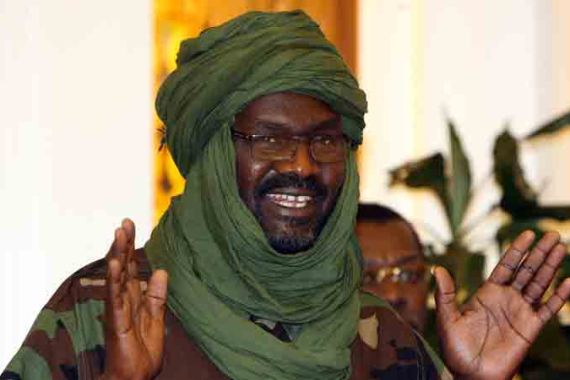Profile: Khalil Ibrahim
Leader of Darfur’s Justice and Equality Movement and the Sudanese army’s fiercest enemy, is killed by the military.

Khalil Ibrahim, who was the leader of the Darfurian rebel group the Justice and Equality Movement (JEM) and the Sudanese Army’s fiercest enemy, was killed on Sunday in a military offensive in North Kordofan region bordering the vast western region Darfur.
His movement’s ideological roots lie with the National Islamic Front (NIF) which, under the leadership of Hassan Turabi, backed a bloodless coup that brought Sudan’s President Omar al-Bashir to power in Khartoum in 1989.
Ibrahim, a physician, initially supported the NIF but became disillusioned with what he saw as its economic neglect of Sudanese regions.
He set up a group of dissidents called “The Seekers of Truth and Justice” and published the “Black Book” in 2000 which detailed Arab domination of Sudanese political power and natural resources.
Exiled to the Netherlands, Ibrahim announced the formation of the JEM, whose core support was limited to his Kobe sub-branch of the non-Arab Zaghawa group, which straddles western Sudan and eastern Chad.
After years of conflict, Ibrahim’s group emerged as the most formidable military challenge to Khartoum’s government.
In its most stunning display of might, the rebels of JEM in 2008 blazed across the desert in trucks loaded with men and guns right up to the capital’s outskirts and launched an attack that shook the government. At least 200 people, including rebels, civilians and security, died in that attack.
The short-lived assault was the first of its kind by the Darfur rebels.
JEM used neighbouring Chad as a rear base, but said they received no military support from Chad’s government.
In April 2009, Ibrahim told Al Jazeera in an exclusive interview recorded at his rebel base camp on the Chad-Sudan border that JEM would seek the independence of Darfur if South Sudan became independent.
The government soon after the assult went into peace talks that produced deals with many rebel factions.
Ibrahim’s group was among them at first, but it soon dropped out over disagreement on the release of prisoners and representation in a future government. He later extended his group’s operation in provinces neighbouring Darfur and threatened to take the fight to Khartoum.
He tried to dominate other rebel groups in an attempt to form a unified position. But divisions along tribal lines and Ibrahim’s own Islamist politics kept him from drawing a slew of rebel groups together under his leadership.
Ibrahim was, however, one of the most successful rebel leaders in securing support from Sudan’s neighbours Libya and Chad in his fight against al-Bashir’s regime – at least for a time.
Turn in fortune
His fortunes began to turn when the president of Chad reached a pact with al-Bashir to end his support for JEM and other rebel groups.
Ibrahim was expelled from Chad and sought refuge in Mouammar Gaddafi’s Libya until Gadhafi’s ouster and killing this year in that country’s civil war.
Since then, Ibrahim’s exact location had not been known.
Sudan’s government said it attacked his convoy as he made his way to Sudan’s newly born neighbour, South Sudan, which seceded from Khartoum in June as a result of a separate, decades-long war against the Arab-dominated government of Sudan.
JEM said its 54-year-old leader died in an air strike and not a “clash” with government forces. A rebel spokesman said Ibrahim was killed by a fighter plane directed by “a spy,” and denied there was a battle between rebel forces and government troops. “When Khalil was attacked he was in his camp,” the spokesman said.
The Darfur conflict and the related humanitarian crisis killed an estimated 300,000 people and displaced 2.7m, according to UN figures. The fighting has tapered off since 2009, but the conflict continues to simmer and local grievances over government neglect remain.
Just days ago, JEM had renewed its threats against Khartoum, saying it would take the fight from the remote western region to the capital to topple al-Bashir’s regime.